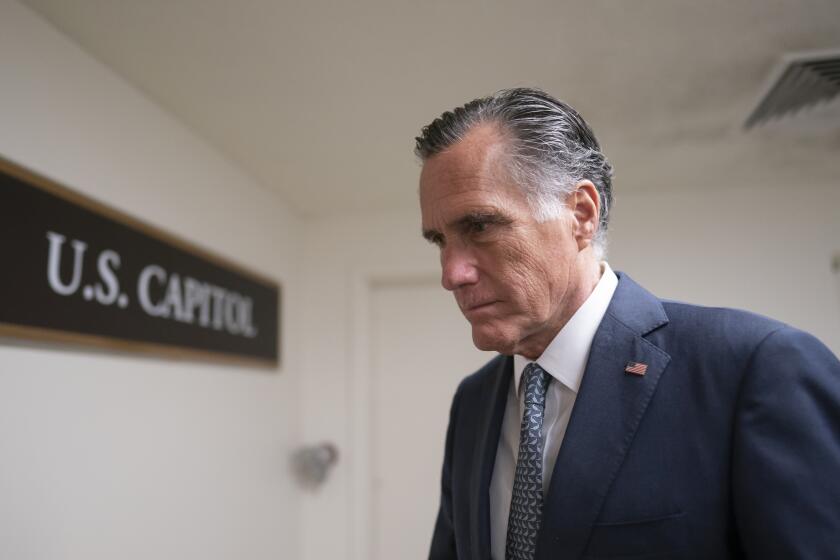Can Liz Cheney defeat ‘Orange Jesus’? Her anti-Trump book sure feels like a campaign memoir

Review
Oath and Honor: A Memoir and a Warning
By Liz Cheney
Little Brown: 384 pages, $33
If you buy books linked on our site, The Times may earn a commission from Bookshop.org, whose fees support independent bookstores.
In these upside-down times, a conservative stalwart can quickly become a pariah to erstwhile allies and a profile in courage to ideological foes. No one has managed that feat more definitively than former Rep. Liz Cheney. For her unstinting criticism of former President Trump’s election-related shenanigans, her vote to impeach him and her role in investigating the Jan. 6 insurrection, she lost first her GOP House leadership post and then her Wyoming congressional seat.
Cheney’s new book, “Oath and Honor,” is a mostly straightforward, occasionally repetitive, literarily undistinguished account of that investigation as well as its antecedents and aftermath. It oozes contempt toward Cheney’s former colleagues, whom she calls “enablers and collaborators.” A particular target of her ire (no surprise here) is former House Speaker Kevin McCarthy, whom Cheney describes as “craven,” “unprincipled,” cowardly and deceitful. “Kevin McCarthy lacked the courage and the honor to abide by his oath to the Constitution,” she writes.
Rep. Liz Cheney said at California’s Reagan library that the Republican Party cannot be loyal to both Trump and the Constitution: ‘We must choose.’
Unlike, of course, Cheney herself, who quotes liberally from her own political speeches as well as remarks she made as vice chair of the Select Committee to Investigate the Jan. 6 Attack on the United States Capitol.
There’s no question that Cheney’s contributions to that Democratic-led committee, her outspoken condemnation of Trump’s increasingly desperate attempts to cling to office and her willingness to risk political exile as a result seem, to many, entirely admirable.

But those who’ve witnessed Cheney’s transformation, watched those powerful, televised committee hearings and generally followed the news won’t be stunned by the thrust of “Oath and Honor.” It’s long been reported (and was underlined in McKay Coppins’ recent “Romney: A Reckoning”) that many Republican officeholders have privately disdained Trump while publicly supporting him. It is not exactly a shock to learn that Rep. Mark Green of Tennessee, while signing his name to electoral-vote objections, muttered, “The things we do for the Orange Jesus.”
After the attack on the Capitol, many GOP officeholders seemed ready to move on from Trump. But Cheney, like others, sees McCarthy’s late January 2021 meeting with the ex-president at his Mar-a-Lago resort as a brake on that momentum. McCarthy assured Cheney that the visit was, in effect, a humanitarian mission prompted by Trump’s alleged depression and inability to eat. But he apparently told different stories to others.
“Oath and Honor” lays out the various schemes by Trump — “the most dangerous man ever to inhabit the Oval Office” — to negate the 2020 election. It reveals Cheney’s own behind-the-scenes attempts to dissuade her colleagues from assisting him as well as her early support for articles of impeachment. And it summarizes the Jan. 6 committee’s efforts to illuminate what Cheney terms, borrowing the title of Philip Roth’s counterfactual novel, “the plot against America.”
But the book falls short of being a classic memoir — or for that matter an engaging read. Its emotional tone rarely veers beyond strident anger and self-righteousness, however well-earned.
McKay Coppins’ new biography, ‘Romney: A Reckoning,’ boasts great access, lots of gossip and questions about whether Romney’s stand against Donald Trump matters.
Behind her tough façade, it is evident how deeply Cheney values the regard of her father, former Vice President Dick Cheney, long a bête noir of liberals. “Defend the republic, daughter,” he tells her at one point. When she joins the Select Committee as one of only two Republican members, he says: “I’m proud of you.”
One interesting subtext in “Oath and Honor” is an understated feminism. During the first (failed) attempt by her GOP colleagues to oust her as conference chair, she recalls in the book, “A number of the men who spoke in favor of removing me said they didn’t like my tone. I wasn’t contrite enough, nor had I learned my lesson.”
Rep. Mike Kelly of Pennsylvania awkwardly analogized Cheney’s criticism of Trump to seeing “your girlfriend sitting on the opponent’s side” during “the biggest game of your life.” Cheney remembers thinking: “You’ve got to be kidding me.” The few GOP women in the conference had a similar reaction: “Other female members started yelling, ‘She’s not your girlfriend!’ ”
Another surprise is the intensity of her bond with two strong Democratic women, former House Speaker Nancy Pelosi and Rep. Zoe Lofgren of San Jose. She finds Lofgren “thoughtful and serious,” with “zero ego.” As for Pelosi, Cheney says, “every time I went to her with a concern, a proposed approach, or a request that she intervene with Democrats … she backed me up.” As a result, “a relationship that had been unimaginable just a few months earlier would now become indispensable.”
Cheney’s scorched-earth comments about her former GOP colleagues have excited the most news coverage. She can be acidic. Of Rep. Elise Stefanik of New York, she writes: “Many of us who had known Elise since before she abandoned all principle were curious about how she had lost her sense of right and wrong.”
Annette Gordon-Reed, Ayad Akhtar, Héctor Tobar, Martha Minow, David Kaye and Jonathan Rauch discuss the Jan. 6 riot and what we do about it.
Rep. Mike Johnson of Louisiana, before his unforeseeable anointing as House speaker, also comes off badly, as someone “especially susceptible to flattery from Trump” who championed positions that Cheney, herself a lawyer, dismisses as “constitutionally infirm.” She accuses Sen. Ted Cruz of Texas of “abandonment of duty for personal ambition” (again, not a shock) and Ohio Rep. Jim Jordan of caring only about winning. (She confirms an earlier report that she swatted away Jordan’s offer of help during the Capitol invasion with the comment, “Get away from me. You f— did this.”)
Senate GOP Leader Mitch McConnell is a tougher case. Cheney applauds his political savvy but is frustrated by his refusal to help convict Trump after his second impeachment. He “got this one wrong,” she writes.
The “warning” part of Cheney’s subtitle is simple: She states repeatedly that Trump is “unfit for any office,” let alone the presidency. But how to defeat him? Is “Oath and Honor,” with its justified outrage and self-mythologizing tone, actually a thinly veiled campaign biography?
In October, on CNN’s “State of the Union,” Jake Tapper asked Cheney whether she was considering a presidential run (presumably as an independent who would attract votes from anti-Trump Republicans). “We’ll see what happens,” she said. With Trump, despite 91 criminal indictments and ongoing civil litigation, still outpacing his GOP rivals and a long campaign road ahead, that tantalizing possibility lingers.
Klein, a freelance journalist in Philadelphia, was a political reporter for the Philadelphia Inquirer.
More to Read
Sign up for our Book Club newsletter
Get the latest news, events and more from the Los Angeles Times Book Club, and help us get L.A. reading and talking.
You may occasionally receive promotional content from the Los Angeles Times.








